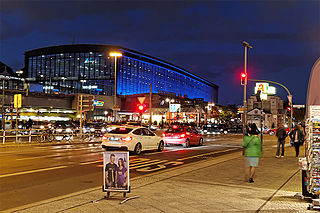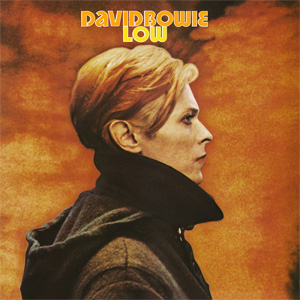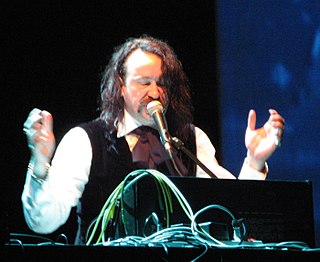
Clean is a 2004 drama film directed by French director Olivier Assayas, starring Maggie Cheung and Nick Nolte. It was jointly funded by Canada, France, and United Kingdom sources. It was released in the United States in 2006.

Intervention is an American documentary television series that premiered on March 6, 2005, on A&E. It follows one/two participant(s), who are dependent or are addicted, documented in anticipation of an intervention by family and/or friends. During the intervention, each participant is given an ultimatum: go into rehabilitation immediately, or risk losing contact, income, or other privileges from the loved ones who instigated the intervention. The producers usually follow up a while later to monitor the addicted person's progress and film it for "follow-up" episodes of the series or for shorter "web updates" available on the show's website.

Berlin Zoologischer Garten Station is a railway station in Berlin, Germany. It is located on the Berlin Stadtbahn railway line in the Charlottenburg district, adjacent to the Berlin Zoo.

28 Days is a 2000 American comedy-drama film directed by Betty Thomas. Sandra Bullock plays Gwen Cummings, a newspaper columnist obliged to enter rehabilitation for alcoholism. The film costars Viggo Mortensen, Dominic West, Elizabeth Perkins, Steve Buscemi, and Diane Ladd.

Candy is a 2006 Australian romantic drama film, adapted from Luke Davies's novel Candy: A Novel of Love and Addiction. Candy was directed by debut film-maker Neil Armfield and stars Heath Ledger, Abbie Cornish and Geoffrey Rush.

Junk, known as Smack in the U.S., is a realistic novel for young adults by the British author Melvin Burgess, published in 1996 by Andersen in the U.K. Set on the streets of Bristol, England, it features two runaway teens who join a group of squatters, where they fall into heroin addiction and embrace anarchism. Both critically and commercially it is the best received of Burgess' novels. Yet it was unusually controversial at first, criticized negatively for its "how-to" aspect, or its dark realism, or its moral relativism.

The Panic in Needle Park is a 1971 American romantic drama film directed by Jerry Schatzberg and starring Al Pacino, in his second film appearance. The screenplay was written by Joan Didion and John Gregory Dunne, adapted from the 1966 novel by James Mills.

The Berlin Trilogy, or Berlin Triptych, consists of three consecutively released studio albums by English singer and songwriter David Bowie: Low (1977), "Heroes" (1977) and Lodger (1979). The albums were recorded after Bowie took up residence in West Berlin in late 1976, and saw him experiment with elements of electronic, krautrock, ambient, and world music in collaboration with American producer Tony Visconti and English musician Brian Eno.
"Neuköln" is an instrumental piece written by David Bowie and Brian Eno in 1977 for the album "Heroes". It was the last of three consecutive instrumentals on side two of the original vinyl album, following "Sense of Doubt" and "Moss Garden".

Alexander Hacke is a guitarist, bass guitarist, singer, musician, record producer, writer and film maker from Germany. He is primarily known as a longtime member of the influential German industrial music group Einstürzende Neubauten.

Christiane F. - Wir Kinder vom Bahnhof Zoo is a soundtrack album by David Bowie, released on LP in 1981 by RCA Victor, for the movie about Christiane F. The German title of the film, Wir Kinder vom Bahnhof Zoo, means "We children of Zoo Station", referring to the railway station in Berlin, Germany.

Memento (Warning) is a novel with reporting elements, written by Czech author Radek John and published in 1986. The story is set in Prague in the 1980s.
Black Tar Heroin: The Dark End of the Street is a 1999 documentary directed by Steven Okazaki. Filmed from 1995 to 1998 in the Tenderloin, San Francisco, California, the documentary describes the lives of heroin addicts.

"Snowbirds Don't Fly" is a two-part anti-drug comic book story arc which appeared in Green Lantern/Green Arrow issues 85 and 86, published by DC Comics in 1971. The story was written by Dennis O'Neil and Neal Adams, with the latter also providing the art with Dick Giordano. It tells the story of Green Lantern and Green Arrow, who fight drug dealers, witnessing that Green Arrow's ward Roy "Speedy" Harper is a drug addict and dealing with the fallout of his revelation. Considered a watershed moment in the depiction of mature themes in DC Comics, the tone of this story is set in the tagline on the cover: "DC attacks youth's greatest problem... drugs!"

Heaven Knows What is a 2014 American-French drama film directed by Ben and Joshua Safdie and written by Ronald Bronstein and Joshua Safdie. The film stars Arielle Holmes, Buddy Duress, Ron Braunstein, Eleonore Hendricks, Caleb Landry Jones and Yuri Pleskun. The film was released on May 29, 2015, by RADiUS-TWC. It is based on Mad Love in New York City, Holmes' unpublished memoir of her life as a homeless heroin addict living on the streets of New York City. She was spotted panhandling by director Josh Safdie, who developed her story into the film. The film is dedicated to Ilya Leontyev, Holmes' boyfriend in the film, who died of an overdose in Central Park in April 2015.

Toxic Love is a 1983 Italian drama film directed by Claudio Caligari. The film depicts a realistic and graphic portrayal of the heroin addiction that afflicted many young drifters in the eighties. The cast was entirely made of amateur actors, of whom most of them were or had been drug addicts.

Heroin(e) is a 2017 American documentary film directed by Elaine McMillion Sheldon and produced by Elaine McMillion Sheldon and Kerrin Sheldon. It was nominated for the Academy Award for Best Documentary Short Subject at the 90th Academy Awards.



















